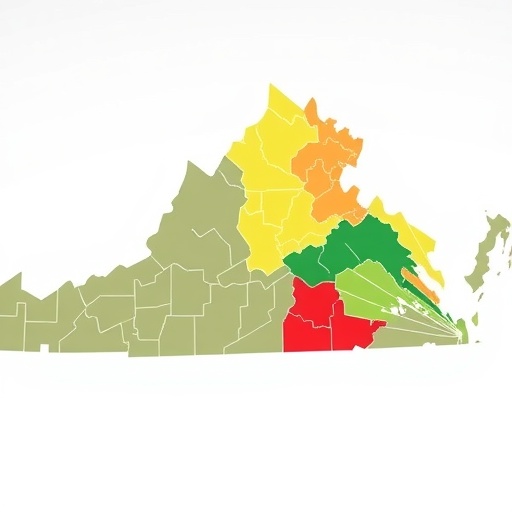Virginia General Assembly Launches Special Session to Tackle Redistricting Reform Amid National Electoral Overhaul
In a bold move to reshape the future of democracy in the Commonwealth, the Virginia General Assembly has convened a special session focused on redistricting reform, signaling a pivotal moment in Virginia politics. Lawmakers from both sides of the aisle gathered in Richmond on Monday, kicking off deliberations that could fundamentally alter how electoral maps are drawn and potentially curb the influence of partisan gerrymandering. This gathering comes at a time when Virginia redistricting has long been a flashpoint, and the session joins a nationwide surge in electoral reform efforts aimed at fostering fairer representation.
- Origins of the Special Session: Bipartisan Frustration Fuels Urgent Call
- Unpacking Virginia’s Redistricting Legacy: From Gerrymandering Scandals to Reform Wins
- Key Reforms on the Agenda: Independent Commissions and Tech-Driven Transparency
- National Echoes and Expert Insights: Virginia Joins a Reform Revolution
- Path Forward: Implications for Virginia’s Electoral Landscape and Beyond
The decision to call this special session was spurred by mounting pressure from advocacy groups, recent court challenges, and a growing recognition that outdated processes undermine voter trust. With the 2020 census data still fresh in mind, Virginia’s leaders are racing against time to implement changes before the next decennial redistricting cycle in 2031. Experts estimate that without reform, the state’s 11 congressional districts and 140 legislative seats could remain skewed, disproportionately favoring one party over another—a issue that has plagued Virginia politics for decades.
According to preliminary agendas released by the General Assembly, the session will prioritize the establishment of an independent redistricting commission, enhanced transparency rules, and public input mechanisms. This isn’t just a Virginia story; it’s part of a broader American conversation, with at least 10 other states enacting similar measures since 2020. As one lawmaker put it, “We’re not just drawing lines on a map; we’re drawing the blueprint for equitable democracy.”
Origins of the Special Session: Bipartisan Frustration Fuels Urgent Call
The spark for this special session ignited last spring when a coalition of Democrats and Republicans in the General Assembly jointly petitioned Governor Glenn Youngkin to convene lawmakers outside the regular session. Frustrations peaked after a series of lawsuits exposed flaws in the 2021 redistricting process, where maps were criticized for diluting minority voting power in urban areas like Richmond and Norfolk. Data from the Princeton Gerrymandering Project revealed that Virginia’s previous districts had a “partisan bias” score of 8.2 out of 10, meaning they heavily favored Republicans despite the state’s near-even partisan split.
Speaker of the House Eileen Filler-Corn (D-Fairfax), a key architect of the push, emphasized the need for action in a statement released prior to the session: “Virginia’s redistricting battles have divided us for too long. This special session is our chance to unite for a process that serves all Virginians, not just the powerful.” On the Republican side, Senate Minority Leader Tommy Norment echoed the sentiment, noting, “Partisan gridlock on maps has eroded public faith. Electoral reform isn’t about party; it’s about preserving the republic.”
The logistics of the special session are no small feat. Funded through a $2.5 million allocation from the state’s contingency budget, the gathering includes virtual participation options for rural delegates and live-streamed hearings to maximize public engagement. Over 50 bills related to Virginia redistricting are on the docket, ranging from modest tweaks to comprehensive overhauls. Attendance is mandatory for all 140 members, with committees forming immediately to hash out priorities. This level of urgency underscores the high stakes: failure to pass reforms could invite federal intervention, as seen in states like North Carolina.
Historically, special sessions in Virginia politics have been rare, reserved for emergencies like budget crises or natural disasters. The last one dedicated to electoral issues occurred in 2002 following a Supreme Court ruling on voting rights. This time, the catalyst is grassroots momentum, bolstered by organizations like the League of Women Voters of Virginia, which collected over 15,000 signatures in support of reform petitions.
Unpacking Virginia’s Redistricting Legacy: From Gerrymandering Scandals to Reform Wins
Virginia redistricting has a storied and often contentious history, marked by infamous gerrymanders that twisted district lines to protect incumbents. The term “gerrymander” itself traces back to 1812, but Virginia’s modern saga began in earnest during the post-Civil Rights era. In the 1990s, the state’s maps were repeatedly struck down by federal courts for racial gerrymandering, leading to the creation of majority-minority districts that were both celebrated and criticized.
Fast-forward to the 2010s: The Republican-controlled General Assembly drew maps after the census that locked in a 8-3 GOP advantage in congressional seats, even as statewide elections flipped Democratic. A 2018 federal court ruling deemed these maps unconstitutional, ordering a redraw and awarding Democrats an extra seat in 2019. Statistics from the Brennan Center for Justice show that between 2011 and 2021, Virginia’s legislative districts exhibited some of the highest levels of packing and cracking—tactics that concentrate or disperse voters to minimize opposition influence.
Progress came in 2020 when voters approved three constitutional amendments establishing a bipartisan advisory commission for redistricting. However, implementation hit snags; the 2021 maps, while more competitive, still drew fire for lacking true independence. A report by FairVote, a nonpartisan electoral reform group, graded Virginia’s process a C-, citing insufficient public hearings and lobbyist influence. One glaring example: The 3rd Congressional District, represented by Democrat Bobby Scott, was redrawn with jagged lines that followed Interstate 64, sparking memes and editorials about “highway districts.”
In the broader context of Virginia politics, redistricting has been a proxy war for power. Democrats gained full control of the General Assembly in 2019 for the first time since Reconstruction, flipping the script on map-drawing. Yet, with Governor Youngkin—a Republican—vetoing several reform bills last year, the special session represents a fragile truce. Historians like University of Virginia professor Larry Sabato point out that Virginia’s swing-state status amplifies these debates: “In a purple state like ours, fair maps could mean the difference between gridlock and governance.”
Adding depth to the narrative, demographic shifts are pressuring reform. Virginia’s population grew by 7.7% from 2010 to 2020, per U.S. Census data, with booming suburbs in Northern Virginia diversifying the electorate. Asian American and Latino populations surged by 85% and 52%, respectively, yet their representation remains diluted in some districts. This special session aims to address these inequities head-on, potentially setting a model for other Southern states grappling with similar dynamics.
Key Reforms on the Agenda: Independent Commissions and Tech-Driven Transparency
At the heart of the special session are concrete proposals to modernize Virginia redistricting. The flagship bill, HB 5001 sponsored by Delegate Chris Jones (R-Suffolk), seeks to constitutionalize a fully independent commission comprising citizens, not politicians. Modeled after Michigan’s successful 2018 reform—which reduced partisan bias by 40%, according to Ballotpedia—this body would include 13 members: five Republicans, five Democrats, and three independents selected via lottery from a pool vetted for conflicts of interest.
Transparency takes center stage with measures mandating open-source mapping software and real-time public dashboards. Under current law, redistricting data is often opaque, with drafts circulated privately. The proposed Electoral Reform Act would require at least 10 public hearings per cycle, live-streamed and accessible via app, echoing California’s independent commission that hosts workshops statewide. Proponents cite a 2022 Pew Research study showing that 68% of Americans distrust the redistricting process; Virginia’s reforms could boost that confidence locally.
Other innovations include AI-assisted criteria to prevent gerrymandering. Tools like those developed by Harvard’s Election Data and Science Lab could score maps for compactness, competitiveness, and community integrity, ensuring districts don’t fracture neighborhoods. Senate Bill 2002, led by Senator Jennifer McClellan (D-Richmond), incorporates Voting Rights Act compliance with algorithmic checks, addressing concerns from civil rights groups like the NAACP Virginia State Conference.
Not all ideas are without controversy. A proposal for ranked-choice voting in primaries—tied to redistricting for multi-member districts—has split the caucuses. Republicans worry it dilutes their base, while Democrats see it as enhancing representation. Fiscal impacts are also debated: Implementing a commission could cost $10 million over a decade, but savings from reduced litigation (estimated at $5 million per major lawsuit) make it palatable.
Stakeholders beyond the General Assembly are weighing in. The Virginia Chamber of Commerce supports business-friendly maps that promote economic growth, arguing stable districts attract investment. Environmental groups push for “green gerrymandering” bans, preventing maps that split conservation areas. These diverse voices highlight how Virginia redistricting intersects with myriad policy arenas.
National Echoes and Expert Insights: Virginia Joins a Reform Revolution
Virginia’s special session isn’t happening in isolation; it’s riding a wave of electoral reform sweeping the nation. Since 2010, 18 states have amended their constitutions to limit partisan control over redistricting, per the National Conference of State Legislatures. Ohio voters approved an anti-gerrymandering initiative in 2018, leading to more competitive maps, while New York’s court-ordered redraw in 2022 flipped four seats. Colorado’s independent commission, operational since 2011, has produced districts with a competitiveness index 25% higher than the national average.
Experts like Ruth Clay from the Democracy Docket podcast praise Virginia’s timing: “As we approach midterms and 2030, states like Virginia are leading by example. This special session could inspire holdouts like Texas and Florida.” A Brookings Institution analysis projects that nationwide independent commissions could increase voter turnout by 5-7% by making races more viable.
In Virginia politics, the session’s outcomes could ripple through 2024 elections. Fairer maps might endanger safe seats, forcing incumbents to campaign vigorously. Delegate Lamont Bagby (D-Henrico), a vocal reform advocate, warned, “Without change, we’ll see more of the same: low-turnout elections where extremes dominate.” Conversely, critics like the Virginia Republican Party chair argue over-reform could politicize the commission itself.
Public opinion polls back the push: A 2023 Quinnipiac University survey found 62% of Virginians favor an independent body for redistricting, with strong support among independents (71%). Youth engagement is rising too; student groups at Virginia Tech and JMU have mobilized, submitting 200 pages of testimony on how maps affect campus voting access.
Path Forward: Implications for Virginia’s Electoral Landscape and Beyond
As the special session unfolds over the next two weeks, expect heated debates, late-night votes, and possible compromises. If successful, reforms could be ratified by voters in November 2024, embedding them in the state constitution. Success metrics include passage of at least two bills and gubernatorial approval, though Youngkin has signaled willingness to sign bipartisan measures.
Looking ahead, these changes promise a more responsive Virginia politics. Competitive districts could foster policy innovation on issues like education funding and climate resilience, drawing from diverse electorates. Nationally, Virginia’s model might accelerate reform in battlegrounds like Georgia, where gerrymandering lawsuits abound.
Ultimately, this special session represents hope amid division. By prioritizing electoral reform, the General Assembly is betting on a Virginia where every voice counts equally—a vision that could redefine the Commonwealth for generations. Stakeholders urge vigilance: Public comments are open until session’s end, offering a final chance for input that shapes tomorrow’s democracy.








